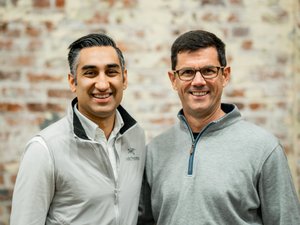
James Walker, CEO of Informative Technologies, and Krutika Patil, a Computer Science graduate student from UNCC who develops apps for Informative Technologies, are plugging areas of low-socioeconomic status into technology through hands-on experience and training as well as affordable hardware.
Using technology to help society is something that was instilled in James Walker early in life. His grandfather was a sharecropper, so Walker’s father, the first of his family to get a college degree, wanted his sons to be aware of the social and mission aspects of technology.
So over time, while working within the IT at Barnhardt Manufacturing – a local cotton manufacturing company – Walker became curious about how the company handled its ‘technology graveyard’ – a stash of old, unused computers and systems. Many of these assets were replaced by faster, smaller, and more powerful computers, so no one was pegged to use these systems in the future.
Walker kept asking questions. ‘Where do they go? Does anyone eventually use them?’ His questions were met with shrugs.
He eventually found that majority (upwards of 70%) of unused hardware went to landfills, and in a few cases some were scrapped and torn apart for its metal and low-traces of precious metals.
Walker pressed himself internally – could these ‘wasted’ machines be put to better use? That question set himself off on a mission to reverse the deepening technology gap between the ends of the economic spectrum through his company Informative Technologies (aka Informative).
His goal is to maximize his triple bottom-line – profitability, social awareness, and environmental impact. So through Informative, Walker is set out to raise digital literacy rates, minimize electronic waste, reinforce STEM (science, technology, engineering, and mathematics) education, and connect technologically underserved communities.
Informative’s platform bridges e-waste and technology deficient communities. Walker wants to shift how companies think about technology’s end-of-life practices. Instead of viewing these old computers as worthless and throwing them away, consider the opportunity to – “transfer resources to the community”, Walker says.
Walker mentions that they – “don’t just give [computers] to the community, we need to have software that runs on that hardware.” They also factor in the operating system. As software and operating systems advance, the donated hardware remains stagnant. So it becomes increasingly difficult to run newer versions of Microsoft Office and Windows on old systems. Planned obsolescence is also an issue. As Microsoft made Windows 10 the only OS option for refurbishers. “If you don’t have a bulk agreement with Microsoft that’s a $100-$110 per license” – which becomes cumbersome to non-profits Walker indicates.
Taking this all into consideration, the Informative team, including Krutika Patil, a UNCC computer science grad student, designed a platform that connects donors with a specific organization’s (non-profit, school, etc.) needs. The goal is to provide an Uber-like experience in giving back to the community.
The team rebuilds the best performing computers of the donated assets and installs their customized back-end software which virtually eliminates any learning curve. The refurbished machine is then sold at a very affordable price-point. Post-install, the platform completes the feedback loop and gives the donor a shareable impact story to help celebrate the donation and widely-share the philanthropic success.
Some communities are interacting with computers for the very first time, so the generic Windows or Mac layout is confusing and unintuitive. “This all runs off of [a] USB drive – a Revive Drive”, Walker explains, which is customized to the organization’s or community’s needs.
The Revive Drive provides a smartphone-like user experience with app icons on various toggling screens. By plugging the Revive Drive in, the donated computer can efficiently run open-sourced apps and software – some can even run in offline environments such as Wikipedia and document editing.
It’s this piece of Informative’s connectivity that has the company receiving recognition. In 2016, they earned Sustain Charlotte’s Social Equity award. The digital divide and connectivity issue is prevalent in Charlotte – 1 out of 5 homes don’t have a working computer, and the state ranks last in economic mobility.
Through a partnership with All Green Recycling – a woman-owned, zero-landfill policy, e-waste recycling B-corp in Charlotte’s North End area – students are employed through government grants to rebuild computers to match a given organization’s need. Students are taught the required skills and are essentially paid to learn as they recycle around a thousand pounds of e-waste a week.
Walker sees it as if they are – “pulling those students into the rest of the tech world. These students almost never have seen the inside of the computer, they’ve never turned a screw on a device.” Through working with Informative, students learn how to assemble and inspect a computer and how to install software on UBS drives and computers.
“They want to learn more, or where they had no plans for college they [now] want to further their understanding of technology and get an A+ certification. They also want to learn how to become an entrepreneur.”
Regardless of new education ambitions, most students for the first time have a substantial resume talking-point where he or she built hundreds of computers. Walker is helping to create a certification tied to this training called a Mission Driven Technician, and Johnson C. Smith University, CPCC, and others are helping to formalize the certification.
Informative is also partnering with UNCC to take advantage of a recent change in e-waste policy for state-owned devices. Previously it was mandatory for state-owned hardware to be wiped and scrapped. The state created a carve-out saying they can go to – “community institutions and non-profits that serve low-income families.” So with the help of the head of sustainability, they are minimizing the university’s e-waste going the landfill.
Eventually, Walker’s audacious goal is to make a global impact with Informative Technologies by continuing to use technology to match needs and to teach skills used in a technology career.
You can learn more about Informative Technology’s mission and their donation options here - https://informativeinc.com/.








